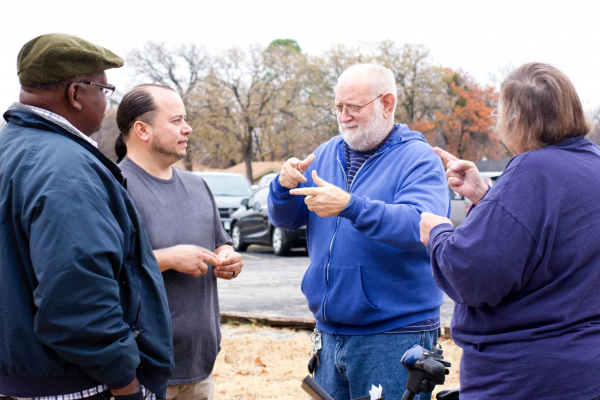
No Simple Answers: What if I feel led to cross-cultural ministry but my significant other doesn’t?
You’ve caught a passion for the least-reached. God’s given you a desire to serve across cultures and a willingness to go. But what if your significant other isn’t interested in ministering in the same way? What should you do if your boyfriend or girlfriend doesn’t sense the Lord leading him or her to the field? Or what if your spouse doesn’t share your passion?
There’s no flowchart or one-size-fits-all path. But these tips can help you think wisely about your relationship—with missions and with your significant other.
Be open in prayer.
God promises to give wisdom to those who ask, and He’s sent the Holy Spirit to guide you and your significant other. So, go to Him, praying for wisdom and openness to what He has for you and for the other person. Ask Him to give both of you hearts that are sensitive to His leading.
Explore your ministry interests together.
The goal isn’t to “convert” your boyfriend, girlfriend or spouse to missions but to share with him or her what you’re passionate about. As you do, look for opportunities to better understand what they care about. You may discover you also have a heart for that issue as well, and God could use the passions He’s given each of you to lead both of you to ministry opportunities that are a good fit.
Ask him or her to read a book about missions with you, participate in a Perspectives class or join a short-term team together. Approach the experience with open hands rather than an agenda, and set aside time to listen to God and to each other.
In addition, look for opportunities to be involved in ministry among the least-reached right where you are—for example, helping a refugee learn English or assisting with a children’s outreach in an immigrant community. In addition, Switchboard, an organization that connects believers’ skills and experience with needs on the field, is a great place to start, especially if you’re not aware of needs in your local area.
Know that both relationships and missions can be idols.
Just as infatuation with a person can skew your priorities and lead to unwise decisions, being enamored with the idea of cross-cultural ministry can make it difficult to discern God’s leading and follow Him as He guides you. As you explore your ministry interests and those of the other person, ask the Lord to show you if your relationship or your desire to serve in a particular way has become an idol. Pray for clarity about why you feel drawn to the mission field as well as about your relationship.
Reject fear.
Questions about calling and relationships are often entangled with numerous fears: If I step away from this relationship, will I be single forever? What if my spouse and I never feel called in the same way? What if I make the wrong choice and then am stuck with it for the rest of my life?
Be honest about what you fear and take those things to God. Ask Him to give you peace and the grace to make decisions rooted in faith and not in anxiety over the what ifs. And remember that you don’t know what the Lord has in store for you—in ministry or in a relationship.
For instance, if you’re preparing for the field solo, it may feel as though choosing cross-cultural ministry means resigning yourself to remain single for the rest of your life. That may be the case. But people obeying God’s leading to serve overseas are typically found … overseas. Many cross-cultural workers find a husband or wife in their host country.
Likewise, staying stateside for now doesn’t mean saying no to ministry in a least-reached community once and for all. God leads individuals and couples to serve in different ways in different seasons and contexts, and you can trust Him to guide you.
Know that unity doesn’t always look the same.
Marriage to a missions-minded believer doesn’t guarantee that you and your spouse will always serve side by side—and that’s not a bad thing! Sometimes, ministering in different ways allows husbands and wives to utilize their gifts and support one another in ways that wouldn’t be possible if both worked in the same kind of role.
For example, Jeremiah and Eleanor* had served cross-culturally in South Asia, and when they married, they were committed to serving God both as individuals and as a couple. They asked themselves, “Can we invest in God’s Kingdom in different ways, allowing Him to guide us?” Together they prayerfully explored how each could serve as the Lord was leading and support one another in those roles. “It has given us the freedom to individually invest our best contributions for ministry in this season of life.”
As they prayed and considered how God had uniquely gifted them in the context of the opportunities before them, they sensed Him leading them to different roles in the United States. Eleanor serves in full-time ministry while Jeremiah works in IT—a position that has given him abundant opportunities to have deep conversations with people from least-reached communities.
Eleanor emphasizes the importance of healthy autonomy and interdependence as a part of unity, whether a couple serves “together” or in different ways. She shares how she and Jeremiah support one another in the challenges they each encounter. “Investing in different spheres expands the capacity we have to be a blessing on a broader scale.”
Be Faithful to God’s Priorities
If you’ve already said “I do,” your first ministry priority is to your husband or wife. God’s Word is clear that marriage is a commitment to be honored (Hebrews 13:4) and that in it, two become one (Matthew 19:4-6). God designed marriage as a picture of the relationship between Christ and His Bride, and He leads husbands and wives to serve in ways that reflect His love to the world. He will never ask you to dishonor your spouse or step back on that commitment to minister in another realm.
If you’re not already committed in marriage, ask God to give you clarity about how to prioritize your relationship with your significant other and about how he’s leading you. If he’s clearly guiding you to serve in a specific way and your boyfriend or girlfriend is heading in a different direction, setting godly priorities might mean breaking things off.
This was the case for Abbie, who called off a relationship with a boyfriend who wasn’t interested in missions. “I recognized that my purpose in life was not to be married but to know Christ and make him known,” she shares. “I felt God asking me to trust Him and step into a much bigger story than the story I was writing for myself.”
Either way, commit yourself to prayer for wisdom in being faithful to God’s priorities. Ask trusted people in your life, such as your pastor, mentor or a godly friend to pray with you and to speak into your situation as the Lord leads.
Trust Him With the Bigger Story
God commands us to seek first His Kingdom and His righteousness, trusting that as we do, He will provide for us—and that includes leading you in your relationships and ministry plans. Ask Him to help you trust Him fully and step into His bigger story.
We’d love to come alongside you as you consider your role in the Great Commission! Just email [email protected] to connect with us.







































_1724957011_600x400.png)


